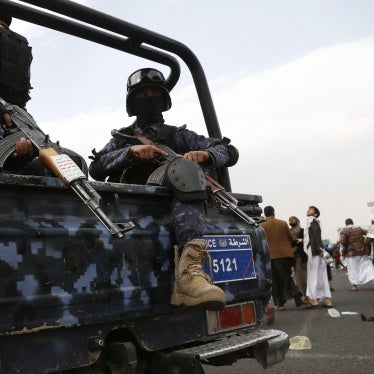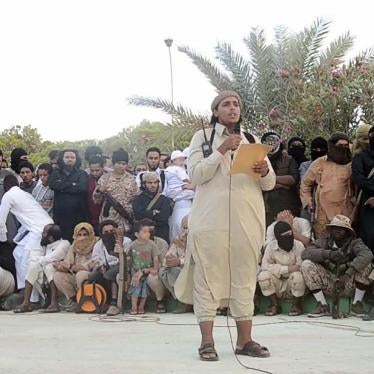President Mohammed Khatami of Iran is scheduled to visit the United Nations next week. On the occasion of this newsworthy trip, Human Rights Watch has prepared the following backgrounder on the domestic situation in Iran. We also attach a recent press release on the Shi'a minority in Afghanistan, which may draw Iran into armed conflict outside its borders.
Since he came into office on August 3, 1997 after a landslide election, President Khatami has encouraged greater freedom of expression. He continues to speak out in favor of respect for human rights, including freedom of association and tolerance of diverse opinions, and he has enabled a vigorous debate about rights and freedoms to blossom in the Iranian media.
But President Khatami has been unable to make any discernible progress in fulfilling his campaign promises to institutionalize the rule of law and to protect the rights of citizens. He is not solely responsible for the lack of fundamental change. As president, he is a junior partner to the Leader of the Islamic Republic, Ayatollah Khamenei, and must also compete with rival power centers in the parliament (Majles), the judiciary and elsewhere. Some of the serious human rights violations in Iran include:
- Prominent dissidents, including writers and editors, continue to be subjected to arbitrary detention and restrictions on their freedom of expression. On September 16, Hamid Reza Jalei-Pour, Mohammad Javadi-Hessar, Mashalla Shamsol-va-Ezin, who are two managers and the editor of a daily newspaper, were arrested by an Islamic revolutionary court for publishing articles against the national "security and general interests."
The former Deputy Prime Minister, Abbas Amir Entezam was detained on September 8, 1998 following public statements critical of the treatment of political prisoners. He has been denied access to his lawyer.
An independent religious scholar, Hojatoleslam Mohssen Saeidzadeh, was detained in June 1998, apparently because of his public criticism of laws relating to the status of women in the family. He has not been able to challenge the legal basis for his detention before a court, and he has been denied access to his lawyer.
Grand Ayatollah Hossein Ali Montazeri, the former designated successor to Ayatollah Khomeini as Leader of the Islamic republic, and other senior clerics, such as Ayatollah Azari Qomi, have been constrained from expressing their views, which are critical of the present government. Ayatollah Montazeri is reported to be under house arrest in his residence in Qom. Several of Ayatollah Montazeri's followers, including his son-in-law, Hadi Hashmei, Abolfazl Musavian and Gholam-Hossein Nadi are in prison for their views. Increasing numbers of dissident clerics are being prosecuted by Special Courts for the Clergy, where clerics are persecuted for their ideas in proceedings which fall far short of international standards.
- The government has repeatedly failed to take steps to halt violent attacks by vigilante groups known as the Ansar-e Hezbollah. These groups serve as enforcers for the conservative clerics, and they have targetednewspaper offices, non-violent demonstrators, and prominent activists. After two government officials -- a minister and a vice president -- were attacked and beaten by these mobs in September, President Khatami finally called for the arrest of the perpetrators. However, no details have been released about whether those responsible are being brought to justice.
- The situation of religious minorities continues to be a cause for concern. On July 21, 1998 Ruhollah Rowhani was executed in the city of Mashad on charges of converting a Muslim to the Baha'i faith. The trial took place in secret. This is the first execution of a Baha'i since 1992 and marks a deterioration in the situation of this intensely persecuted religious minority. At least fifteen other Baha'is are currently in prison, seven are believed to have been sentenced to death for their faith.
Sunni Muslims have also been persecuted. In June, Molavi Imam Bakhsh Narouie, the prayer leader of a Sunni mosque, was killed in the town of Miyankang, in Sistan va Baluchestan Province. Local Sunnis believe that the government killed him, although there is no hard evidence to support that assertion. In May, a 60-year-old Jewish businessman, Ruhollah Kadkhoda-Zadeh was arrested, and later hanged in prison. Several Jewish Iranians have been arrested for spying for Israel in the past, but in this case, the authorities never declared his crime. A month after his arrest, they handed over his body to his family, with an order to bury him without any religious ceremony.
- Torture continues to be widespread during the investigation phase of criminal prosecutions. In March, more than 150 deputies in the Iranian parliament called for an investigation into allegations that police tortured Tehran city officials during their detention. The city officials, including several district chiefs, were arrested over the course of several months last year, as part of an investigation into financial corruption in the municipality and its mayor, Gholam Hossein Karbaschi. President Khatami has ordered a review of these credible torture allegations, but this has yet to be carried out.
- In an open challenge to the more open climate of debate, in July the parliament passed a law outlawing "encouraging conflict between men and women by promoting rights outside the norms of the Shari'a."The legislation clearly targeted activists who have been campaigning for reform in laws which discriminate against women, and fail to protect the best interests of children.
- Conservative forces opposing the more open debates in the media have used the vaguely-worded press law to shut down newspapers. Several newspapers, including Panshambeha, Gorzaresh-Ruz, Jameh, Khaneh, Tous, and Rah-e No have been closed, at least temporarily, in the last three months.
- The government continues to obstruct access to the country for international human rights monitors, including the UN Special Representative, Mr. Maurice Copithorne. Human Rights Watch has repeatedly been denied permission to visit the country. Independent domestic human rights monitoring is severely restricted, making the work of international monitors especially important.
President Mohammed Khatami of Iran is scheduled to visit the United Nations next week. On the occasion of this newsworthy trip, Human Rights Watch has prepared the following backgrounder on the domestic situation in Iran. We also attach a recent press release on the Shi'a minority in Afghanistan, which may draw Iran into armed conflict outside its borders.








